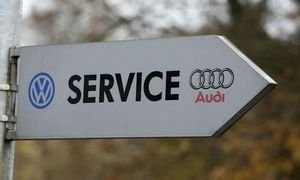VW Gets Approval for Diesel Fixes in Europe

The fixes apply to 1.2-liter, 1.6-liter and 2.0-liter engines and the approval by Germany's KBA motor transport authority extends across the European Union's 28 national markets, VW said in a statement today.
"After the measures have been implemented, the vehicles will fulfill the duly applicable emissions standards, with the aim of achieving this without any impairment of engine output, fuel consumption or performance," the statement said.
The 1.2- and 2.0-liter engines will get a software upgrade that requires about 30 minutes of labor time. The 1.6-liter engine will require the installation of a piece of mesh to regulate air flow in addition to a software upgrade. The labor time for implementing these measures will be less than an hour, VW said.
The affected vehicles will be called into workshops in several waves. The fixes for the 2.0-liter engines will start in the first quarter of next year. The 1.2-liter engine fixes will begin at the end of the second quarter and the 1.6-liter engines will be recalled in the third quarter.
Volkswagen says it expects to start notifying affected customers in the next few weeks.
The carmaker admitted in September that it had installed software in about 11 million vehicles worldwide in VW, Audi, Skoda and Seat models. The "cheat" software lowered the level of nitrogen oxides emitted when it detected the car was being tested.
Still to come is a ruling in the U.S., where regulators first uncovered the diesel deception. Approval of repairs in Germany doesn’t guarantee an agreement with U.S. regulators.
In separate issues, Volkswagen has admitted providing false CO2 emissions data and fuel usage that affects thousands of vehicles in Europe. U.S. regulators have also targeted 85,000 VW, Audi and Porsche models with 3.0-liter V-6 diesel engines fitted with emissions-control equipment that was not properly disclosed.
Nouvelles connexes


